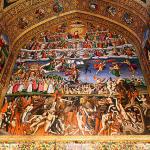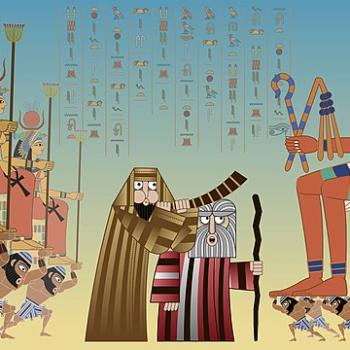Anson: You do know, my friend, that a defining feature of ancient Canaanite religion was a constant solicitation of the dead for help in everyday affairs. You are aware of the fact that communication with revered ancestors, who had gone on to the land of Mot, was an integral part of their daily devotions.
Squire: And what, pray tell, does that have to do with the Roman Catholic veneration of saints? Or with the intercession of the saints in the lives of Catholic believers?
Anson: Does “necromancy” ring a bell? I know you’ll disagree vigorously, but let me just say this: necromancy is asking the dead for help; Catholics praying to deceased people is asking the dead for help. And asking the dead to ask Christ to help them is adding the sin of idolatry to the crime of necromancy.
Squire: What a confusion of misnomers! Have you never read where Jesus refuted the Sadducees (who denied the resurrection of the dead) by telling them that God was not a God of the dead? And that those who died in righteousness are not dead, of course, but very much alive in the presence of the Father? How then can I be guilty of necromancy if I am praying to people who are actually more “alive” than I am? Or than you are, for that matter. As to idolatry —
Anson: Hold on a moment, if you will. You’re playing both ends against the middle (if that’s the correct phrase) – or rather you’re trying to pay with one side of the coin while disingenuously ignoring the other side. What I mean is, you know quite well that human beings who have died clinically and medically are dead – stone cold dead, and no question about it. At the same time, if they truly belonged to Christ during their lives, they are simultaneously alive in heaven. They are both alive and dead at the same time. Would you agree with that?
Squire: Yes, as far as it goes. My point is that they are certainly alive enough to hear my prayers, when I cry out to them for assistance, whether that assistance involves going to the Blessed Mother to intercede with her Son, or going to St Alfonso for the same favor. The saints may be dead in your medical, clinic sense, but not so dead as to be indifferent to my pleas for help.
Anson: A comforting thought, no doubt. And that element of emotional, reassuring comfort no doubt played a large part in the thought becoming established doctrine in your church. If only there was scriptural support for all this untrammeled discourse between Earth and Heaven. I can envision the need for a multitude of spiritual “air traffic controllers” for all this great tangle of chatter, directed by innumerable folks to innumerable saints and other semi-divine creatures, all these lines of desperate petition crisscrossing each other in a deafening din.
Squire: You mock, as mockers have mocked for hundreds of years. But terms like “tangle” and “din” and untrammeled” simply indicate to me that you undervalue the omnipotence of the Deity you profess to worship. There is surely no question of confusion in the affairs of Heaven. Which thought leads me back to my objection to your use of the word “idolatry”.
Anson: Yes, please go on.
Squire: No one in my church is permitted to worship anyone or anything but the Godhead, the Blessed Trinity. Not angels, not archangels, not Mary, not saints – no one. I know you are familiar with the distinctions between dulia, hyperdulia, worship, and veneration….
Anson: Oh yes, quite so. And allow me to interrupt you long enough to say that I am also very familiar with the fact that anything that comes between me and God, or me and Jesus, is an idol, regardless of how innocent it may appear to be. If this item, or phenomenon, or person, or practice, or whatever, distracts me from direct contact or communication with that Blessed Trinity, then it is an idol.
Squire: And what if that “person” brings you to Christ Himself?
Anson: But you’re talking about persons who go to Christ on your behalf, not those who bring Christ to me, as an evangelist does, for example.
Squire: If a saint asks Christ to go to you with “healing in His wings”, as the result of my prayer to the saint, then what do you think? Has not that saint brought Jesus to you, in a massively helpful way?
Anson: And why cannot I go directly to the Father (as Christ directs us to do) and ask Him to provide help through the Holy Spirit? Simple, right? We can cut out the middle man, as it were, and cultivate, as we certainly should, an immediate, personal relationship with the Lord. I recall hearing on the radio once a Catholic promotional announcement that actually said “remember to dedicate yourselves this week to the Blessed Saint Joseph”, or words almost exactly like those. No, thank you. I am far too busy dedicating my time and my poor, scanty spiritual resources to the Lord Jesus Christ, Who is in fact God Himself. It would be stark idolatry to spend a week concentrating on the stepfather of Jesus, when I could be talking to the Listening Shepherd Himself.
Squire: If you asked a Christian friend at your church to pray for you, would that be idolatry?
Anson: Believe me, my friend, I am in no danger of extending to anyone at my church any form of dulia, hyperdulia, or worship. Perhaps – if he or she is exceedingly pious – I might offer him or her a small slice of veneration. The point is: everyone in my acquaintance will redirect me to Christ or the Father. Yes, they will pray for me, which is a species of charity. But they do not live in that dual state of “being dead” and “being alive”. There is no danger of necromancy. And they would be aghast at the prospect of my praying to them, whether they were alive or deceased. For good reason: time and attention spent with the mother of Jesus is time and attention taken away from her Son. What do I recall her saying at the Cana wedding?: “Do whatever He tells you to do.” And how does He tell me to pray? “Our Father, Who art in Heaven….” Our Father. No one else.













